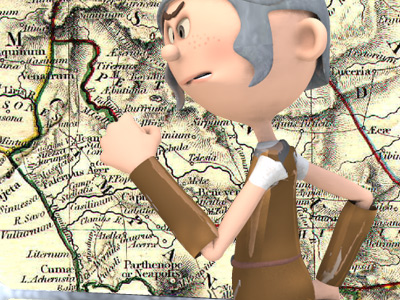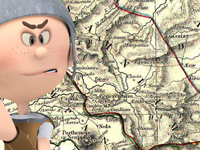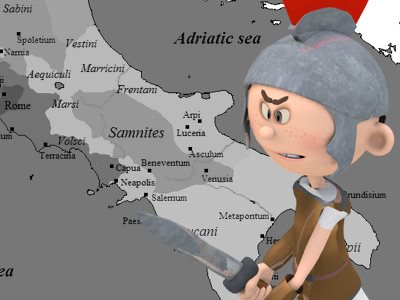Third Samnite War (298-290 BC)

297 BC Rome turns to Samnium
The elections of the consuls for 297 BC took place amid rumours that the Etruscans and the Samnites were raising huge armies. The Romans turned to Quintus Fabius Maximus Rullianus, Rome's most experienced military commander, who was not a candidate for election and refused the proposal. He then relented on condition that Publius Decius Mus, who had been consul with him in 308 BC, would be elected as his colleague. It is impossible to establish whether Livy had any evidence for the existence of these rumours, or if they are just conjecture by him or his sources.
Livy is the only source for the events of 297 BC. He wrote that envoys from Sutrium, Nepete (Romans The Roman Republic was a form of government of Rome and the era of the classical Roman civilization when it was run through public representation of the Roman people. Beginning with the overthrow of the Roman Kingdom (traditionally dated to 509 BC) and ending in 27 BC with the establishment of the Roman Empire, Rome's control rapidly expanded during this period - from the city's immediate surroundings to hegemony over the entire Mediterranean world. colonies) and Falerii in southern Etruria arrived in Rome with news that the Etruscan city-states were discussing suing for peace. This freed both consuls, who marched on Samnium, Quintus Fabius by way of Sora and Publius Decius through the land of the Sidicini. A Samnite army had prepared to confront them in a valley near Tifernum, but it was defeated by Quintus Fabius. Meanwhile, Publius Decius had camped at Maleventum where an Apulian army would have joined the Samnites in the battle against Quintus Fabius had Publius Decius not defeated it. The two consuls then spent four months ravaging Samnium. Fabius also seized Cimetra (location unknown). There are no major problems with Livy's account, but no parallel sources survive to confirm it either. Fabius' route via Sora to Tifernum is convoluted, but not insurmountable. The appearance of an Apulian army at Maleventum is surprising since nothing is known of Apulian hostility to Rome since the conclusion of peace in 312 BC. However the Apulians might have been divided in their alliance with Rome or have been provoked to war by the campaign of Barbatus the previous year. Publius Decius' campaign fits within the larger pattern of Roman warfare in south-eastern Italy; he might even have wintered in Apulia. No triumphs are recorded in this year for either of the consuls, hence they are unlikely to have had any victories of great significance or made any deep inroads into Samnium.
The Roman Republic was a form of government of Rome and the era of the classical Roman civilization when it was run through public representation of the Roman people. Beginning with the overthrow of the Roman Kingdom (traditionally dated to 509 BC) and ending in 27 BC with the establishment of the Roman Empire, Rome's control rapidly expanded during this period - from the city's immediate surroundings to hegemony over the entire Mediterranean world. colonies) and Falerii in southern Etruria arrived in Rome with news that the Etruscan city-states were discussing suing for peace. This freed both consuls, who marched on Samnium, Quintus Fabius by way of Sora and Publius Decius through the land of the Sidicini. A Samnite army had prepared to confront them in a valley near Tifernum, but it was defeated by Quintus Fabius. Meanwhile, Publius Decius had camped at Maleventum where an Apulian army would have joined the Samnites in the battle against Quintus Fabius had Publius Decius not defeated it. The two consuls then spent four months ravaging Samnium. Fabius also seized Cimetra (location unknown). There are no major problems with Livy's account, but no parallel sources survive to confirm it either. Fabius' route via Sora to Tifernum is convoluted, but not insurmountable. The appearance of an Apulian army at Maleventum is surprising since nothing is known of Apulian hostility to Rome since the conclusion of peace in 312 BC. However the Apulians might have been divided in their alliance with Rome or have been provoked to war by the campaign of Barbatus the previous year. Publius Decius' campaign fits within the larger pattern of Roman warfare in south-eastern Italy; he might even have wintered in Apulia. No triumphs are recorded in this year for either of the consuls, hence they are unlikely to have had any victories of great significance or made any deep inroads into Samnium.
HISTORY

RESOURCES
This article uses material from the Wikipedia article "Samnite Wars", which is released under the Creative Commons Attribution-Share-Alike License 3.0.
© Stories Preschool. All Rights Reserved.











